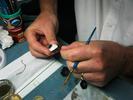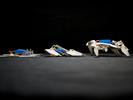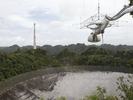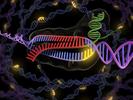Joe Palca appears in the following:
Where We Learn That Artificial Eyes Really Aren't Round At All
Monday, August 11, 2014
If you think that an artificial eye looks like a big glass marble, you're not alone. And you're wrong. We visit the people who made a prosthetic eye for a 5-year-old boy who lost an eye to cancer.
Transformer Paper Turns Itself Into A Robot. Cool!
Thursday, August 07, 2014
Start with paper; add Shrinky Dinks, a microprocessor, heat, and voila! It's not quite that easy. But this engineering project might one day lead to a printable, flat spacecraft that folds itself.
Close Encounters Of The Radio Kind? Mystery Bursts Baffle Astronomers
Saturday, July 26, 2014
Astronomers have a mystery on their hands. Two large radio telescopes, on opposite sides of the planet, have detected very brief, very powerful bursts of radio waves.
Right now, astronomers have no idea what's causing these bursts or where they're coming from. And nothing has been ruled out at the ...
Rosetta Spacecraft Readies For Rendezvous With Comet
Tuesday, July 22, 2014
The Rosetta spacecraft hibernated for 31 months while its orbit took it too far away from the sun for its solar arrays to keep it operational. It's ready for a rendezvous with a comet Aug. 6.
To Make A Spacecraft That Folds And Unfolds, Try Origami
Thursday, July 17, 2014
The traditional Japanese art of folding paper is now adding grace and ease to the deployment of fragile solar panels, seismometers and other vital instruments in outer space.
Why Theories On Black Holes Are Full Of Holes
Tuesday, July 01, 2014
Research indicates that black holes are more common than astronomers previously thought. (This piece initially aired on August 7, 2013, on All Things Considered).
If They Want To Make Anything, Proteins Must Know How To Fold
Friday, June 27, 2014
As part of the series "Unfolding Science," NPR's Joe Palca presents the science of protein folding. A properly folded protein keeps you alive; a misfolded protein can kill you.
A CRISPR Way To Fix Faulty Genes
Thursday, June 26, 2014
This technique for manipulating genes borrows a strategy from the way bacteria fight viruses. It's still experimental, but the possibilities excite medical researchers hoping to tailor treatments.
How Did The Meter Get Its Length?
Monday, June 23, 2014
The U.S. doesn't routinely use the metric system. The U.S. government definition of a foot is 0.3048 meters. But if the length of a foot is based on the meter, what's the length of the meter based on?
To Put Two Rovers On Mars, Scientists Had To Get Clever With Packing
Monday, June 09, 2014
To fit in their shipping container, two Mars rovers had to be folded up into a tiny package and then unfolded — a prime example of what NPR science correspondent Joe Palca calls "unfolding science."
Phone App Might Predict Manic Episodes In Bipolar Disorder
Saturday, May 31, 2014
There are smartphone apps for monitoring your diet, your drugs, even your heart. And now a Michigan psychiatrist is developing an app he hopes doctors will someday use to predict when a manic episode is imminent in patients with bipolar disorder.
People with the disorder alternate between crushing depression and ...
The First American Teenager, Millennia-Old And Underwater
Sunday, May 18, 2014
DNA from the skeleton of a 12,000-year-old teenage girl found on Mexico's Yucatan Peninsula shows that today's Native Americans are descended from Siberians who spread southward across North America.
Faith Drives A Father To Create A Test For Childhood Cancer
Wednesday, May 07, 2014
Noah Shaw was diagnosed with a potentially fatal cancer when he was just 4 months old. That didn't shake his father's faith in God. But it did drive him to try to invent an early cancer test.
Chemist Turns Software Developer After Son's Cancer Diagnosis
Tuesday, May 06, 2014
The parents of a young boy made a terrible discovery while looking through photographs they had taken of him as a baby. They noticed a white dot where a black pupil should have been.
Drought-Stricken Texas Town Turns To Toilets For Water
Tuesday, May 06, 2014
Wichita Falls may soon be one of the first cities in the nation where half the drinking water comes directly from wastewater. It will save water, but some residents find the process tough to swallow.
Eyewire: A Computer Game to Map the Eye
Monday, May 05, 2014
MIT scientist Sebastien Seung at MIT invented the game to help him make a map of the cells in the mammalian retina. A year later, he says the game is producing valuable science.
Dartmouth Celebrates 50 Years Of BASIC Computer Language
Thursday, May 01, 2014
The new programming language, developed five decades ago, didn't require code to be entered on punch cards. It also allowed computer novices to begin programming without a lot of academic training.
The Scientist Who Makes Stars On Earth
Thursday, March 06, 2014
An astrophysicist is using something called the Z machine at Sandia National Lab to recreate the conditions on a white dwarf star — only for a few nanoseconds, but still, enough to study.
To Clean Drinking Water, All You Need Is A Stick
Wednesday, March 05, 2014
Removing bacteria and other impurities from water could be done more cheaply thanks to researchers at MIT. They're taking advantage of the way trees move water to filter it.









